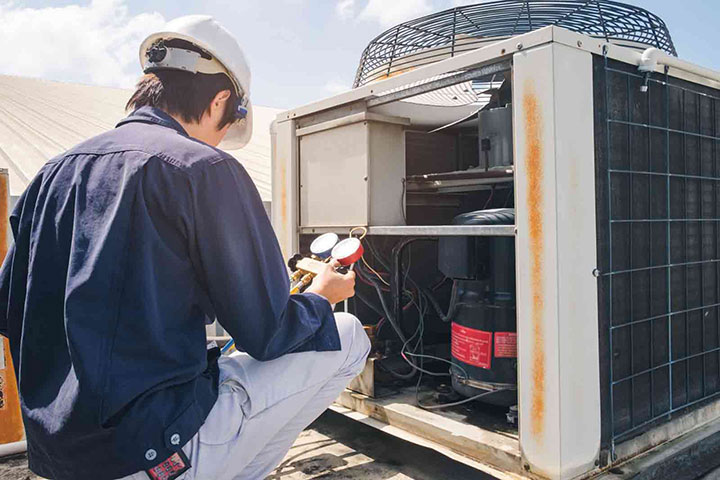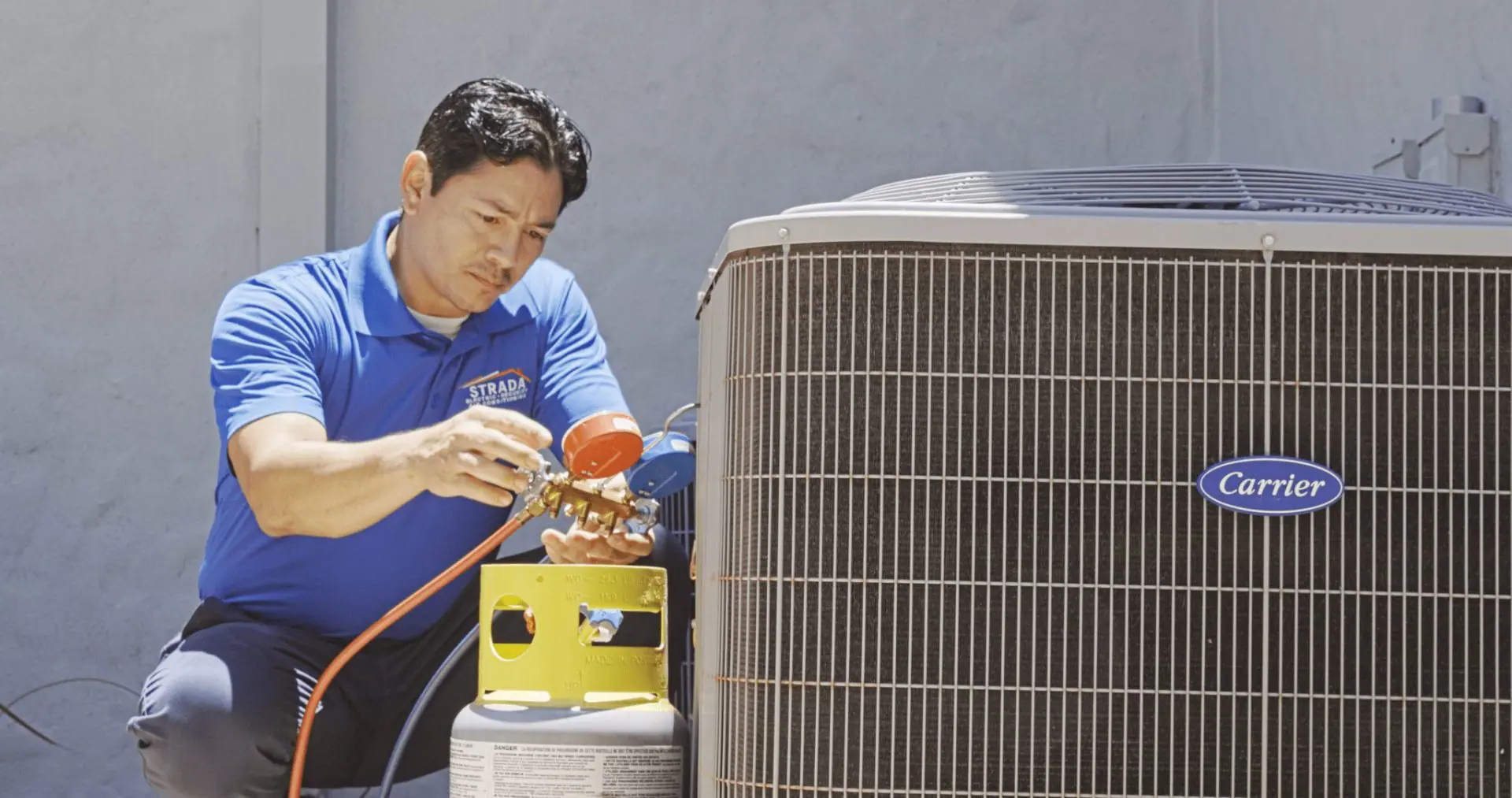Installing ductless mini splits: A Wise Investment for Energy-Efficient Living
Wiki Article
Choosing Between a Heatpump and Heater: Trick Factors To Consider for Your HVAC Needs
When assessing heating choices for a/c requires, the decision between a warm pump and a furnace can be complicated. Each system provides unique advantages tailored to specific climates and energy efficiency objectives. Comprehending these distinctions is important for making an educated choice. Key factors such as installation prices and ecological effect even more complicate the selection procedure. Which alternative genuinely lines up with one's comfort and sustainability choices? The following areas will explore these factors to consider carefully.Comprehending Warm Pumps: How They Function and Their Benefits
While many house owners think about different heating alternatives, comprehending how warmth pumps function and their benefits can substantially influence their choice. Warm pumps operate by moving warm instead of creating it. In the wintertime, they extract heat from the outdoors air or ground and transfer it inside your home, while in the summer, they reverse this procedure, cooling the home by eliminating warm outside. This double performance makes them functional for year-round environment control.One of the primary benefits of heatpump is their energy performance. They use substantially less electrical energy compared to conventional furnace, potentially resulting in reduced utility costs (heat pump installation ooltewah tn). Furthermore, heat pumps have a smaller carbon footprint, making them an environmentally friendly option. They likewise need less maintenance than traditional systems, adding to lasting expense financial savings. On the whole, understanding the mechanics and advantages of heatpump can help homeowners make informed decisions concerning their home heating and cooling down requirementsChecking Out Heating Systems: Kinds, Operation, and Advantages
Heating systems are available in different types, consisting of gas, electrical, and oil designs, each with distinctive functional devices. Understanding these distinctions is crucial, as they influence effectiveness and heating performance. Additionally, furnaces offer numerous advantages, such as constant heat output and dependability in chillier environments.Sorts of Furnaces
Home heating systems can vary significantly in layout and procedure, with furnaces being a preferred selection amongst house owners. There are a number of types of furnaces, each making use of various fuel sources and innovations. Gas furnaces are typical, leveraging all-natural gas to create heat efficiently. Electric heaters, on the other hand, use electrical resistance to create warmth, commonly favored for their uncomplicated installment. Oil heating systems, while much less common, are reliable in areas with restricted gas access (heat pump installation ooltewah tn). Furthermore, condensing furnaces maximize energy performance by capturing and recycling exhaust gases. Each kind operates with a system of warmth exchangers and ductwork to distribute warm air throughout a home. Recognizing the distinctions in between these heater types is crucial for notified cooling and heating decisionsBenefits of Heaters
For homeowners seeking reliable warmth during chilly months, the advantages of heaters are considerable. Heaters offer constant home heating, making certain also temperatures throughout the home. They are particularly effective in extreme chilly, often outshining warmth pumps in frigid conditions. Various kinds, including gas, electric, and oil furnaces, provide versatility to satisfy diverse requirements and preferences.Furnaces likewise have a tendency to have reduced preliminary setup expenses compared to warm pumps, making them a much more easily accessible alternative for several. Their durable style contributes to a longer life-span, with several devices lasting over 15 years with correct upkeep. Furthermore, contemporary heating systems are typically furnished with advanced technology for improved performance, which can bring about minimized energy bills. Overall, furnaces remain a reliable choice for effective home heating.
Power Efficiency: Comparing Warmth Pumps and Furnaces
When contrasting energy effectiveness in between heat pumps and heating systems, the Seasonal Energy Efficiency Ratio (SEER) plays a crucial role in figuring out efficiency. In addition, an operational expense evaluation discloses the long-term monetary effects of each system. Understanding these elements can lead homeowners in making notified decisions about their heating remedies.Seasonal Energy Efficiency Proportion
Power performance plays an important function in the decision-making process between heatpump and heaters, specifically when taking into consideration the Seasonal Power Performance Proportion (SEER) This statistics actions the cooling performance of warmth pumps over an entire air conditioning period, offering a standard way to examine performance. Higher SEER rankings indicate better power performance, equating to lower energy consumption and reduced energy costs. In contrast, furnaces are normally analyzed making use of the Yearly Fuel Utilization Efficiency (AFUE) ranking, which mirrors heating efficiency. When contrasting these 2 systems, house owners ought to prioritize SEER rankings for warm pumps, as they directly influence general energy financial savings and ecological sustainability. A complete understanding of SEER can significantly influence the long-term satisfaction and cost-effectiveness of the picked cooling and heating option.Operational Cost Evaluation
Comprehending the functional costs related to heatpump and heating systems is crucial for house owners evaluating their alternatives. Heatpump normally supply greater power efficiency, converting electric energy into warm with minimal waste. see this here This leads to reduced regular monthly energy bills, particularly in modest environments. Conversely, typical furnaces, especially gas models, may have reduced upfront expenses yet can incur greater functional expenses in time as a result of fuel costs and performance ratings.Moreover, warm pumps can operate as both heating and cooling systems, possibly lowering the need for different heating and cooling systems. While first investments for heat pumps might be greater, their lasting savings in energy efficiency can make them a much more cost-efficient choice for numerous households. Mindful analysis of regional power prices is vital to figure out the most effective option.Installment Costs: What to Anticipate for every Heater
Installment prices for heating unit can differ considerably between warm pumps and furnaces, influencing homeowners' decisions. Heatpump typically have higher upfront installation costs, generally ranging from $3,500 to $8,000, depending on the unit size and intricacy of installment. This includes the outdoor device, indoor handling system, and essential ductwork adjustments. Alternatively, heaters often tend to have lower preliminary prices, averaging between $2,500 and $6,000, which can be appealing for budget-conscious property owners. Nevertheless, installation expenditures can raise if considerable ductwork is required.Moreover, the selection of fuel type for heaters-- all-natural gas, lp, or electric-- can additionally influence installation prices. While heatpump provide energy performance, their preliminary financial investment might deter some customers. Eventually, assessing installment expenses alongside lasting savings and performance will aid house owners in making informed choices about their heater.Climate Factors To Consider: Which System Carries Out Much Better in Your Area
Just how do climate problems affect the efficiency of heating unit? The performance of heatpump and furnaces can vary greatly depending upon the neighborhood climate. In modest environments, heat pumps stand out by efficiently moving warm from the outdoors air, making them an energy-saving option. Nonetheless, their performance reduces in very chilly temperatures, where they may battle to remove adequate warmth. On the other hand, heaters, particularly gas models, supply constant and trusted heat despite outdoor conditions, making them more effective in chillier regions.In locations that experience milder winters months, heat pumps can operate efficiently year-round, offering look what i found both cooling and heating. In comparison, regions with extreme wintertimes usually gain from the effectiveness of heaters. Inevitably, understanding the local climate is important when choosing between a heat pump and a furnace, as it directly influences their functional efficiency and overall performance.Maintenance Demands: Long-Term Look After Warmth Pumps vs. Furnaces
While both heat pumps and heaters require regular maintenance to assure peak efficiency, their specific demands and care routines vary substantially. Furnaces commonly need much less regular attention, with yearly evaluations sufficing to look for gas leaks, tidy filters, and assess total performance. Their less complex style often enables for straightforward repairs.In comparison, heatpump require semiannual maintenance as a result of their dual function in cooling and heating. This consists of cleaning coils, inspecting cooling agent levels, and making sure that both the outside and interior units work at their ideal. Additionally, warm pump upkeep frequently involves even more detailed components, making expert servicing essential.Neglecting upkeep can bring about lessened effectiveness and boosted energy prices for both systems. Eventually, property owners must consider these long-term care requirements when selecting between a warm pump and a heating system, as aggressive upkeep can expand the life-span and performance of either system considerably.Environmental Impact: Choosing a Sustainable Heating Option
The environmental impact of furnace is a vital analysis for homeowners looking for lasting alternatives. Warmth pumps are normally extra energy-efficient than typical heaters, as they move warmth instead of produce it, considerably minimizing carbon exhausts. By using renewable resource sources, such as geothermal or air-source warmth pumps, home owners can better decrease their environmental footprint.On the other hand, all-natural gas heaters emit greenhouse gases and add to air pollution, though they usually offer higher heat result. Advancements in modern technology have actually led to the development of high-efficiency heaters that lessen emissions.Ultimately, selecting a home heating system involves considering effectiveness versus environmental influence. House owners are encouraged to mirror on local power sources and rewards for renewable systems, making certain a choice that straightens with both personal comfort and ecological obligation. The choice impacts not just immediate comfort but additionally long-term sustainability and ecological health.Regularly Asked Concerns
The Length Of Time Do Warm Pumps and Furnaces Usually Last?
The life expectancy of heatpump usually ranges from 15 to 20 years, while furnaces can last between 15 to thirty years. Regular upkeep substantially impacts their longevity and effectiveness in giving heating services.Can I Utilize a Heatpump in Exceptionally Cold Climates?
Warmth pumps can operate in incredibly chilly environments, yet their efficiency decreases as temperature levels decline. In such problems, supplemental heating sources might be essential to keep comfortable indoor temperatures and ensure peak performance.
What Is the Sound Degree of Heat Pumps Versus Furnaces?
The sound levels of heat pumps and heaters vary substantially. Normally, heat pumps run more silently than traditional heaters, making them more suitable for those conscious seem, while heaters may generate louder functional sounds throughout heating cycles.
Are Warmth Pumps Suitable for Both Heating & Cooling?
Heatpump are indeed suitable for both heating & cooling (heat pump installation ooltewah tn). They operate by transferring heat, giving reliable temperature control year-round, making them a functional choice for house owners seeking an all-in-one heating and cooling remedyWhat Size Heating System Do I Required for My Home?
Determining the suitable dimension heating unit for a home requires examining factors such as square video, insulation high quality, neighborhood climate, and the home's format. Consulting an expert can guarantee a precise analysis and ideal comfort. Warm pumps commonly offer higher energy efficiency, converting electric energy right into warm with marginal waste. In modest environments, heat pumps excel by efficiently transferring warm from the outdoors air, making them an energy-saving choice. On the other hand, heaters, specifically gas models, offer reputable and constant heat no matter of exterior conditions, making them more suitable in cooler regions.In locations that experience milder winters, warm pumps can run effectively year-round, offering both home heating and air conditioning. Warm pumps are typically much more energy-efficient than conventional heating systems, as they transfer warmth instead than produce Home Page it, considerably minimizing carbon discharges. By using renewable power resources, such as air-source or geothermal heat pumps, homeowners can further decrease their eco-friendly footprint.On the other hand, natural gas heaters send out greenhouse gases and add to air pollution, though they typically offer greater warm output.Report this wiki page